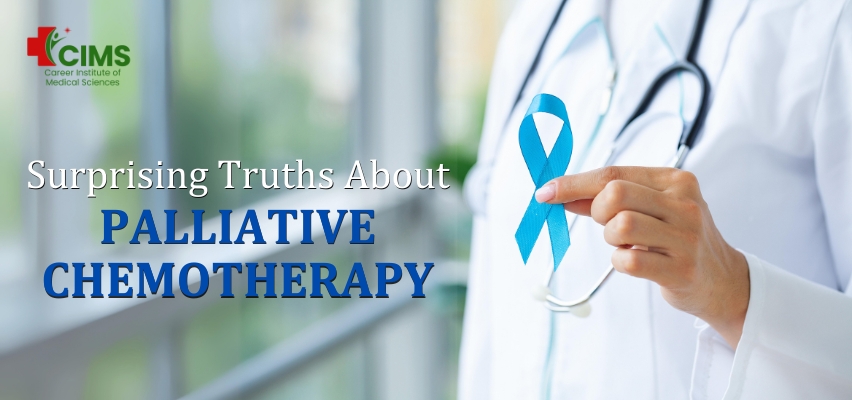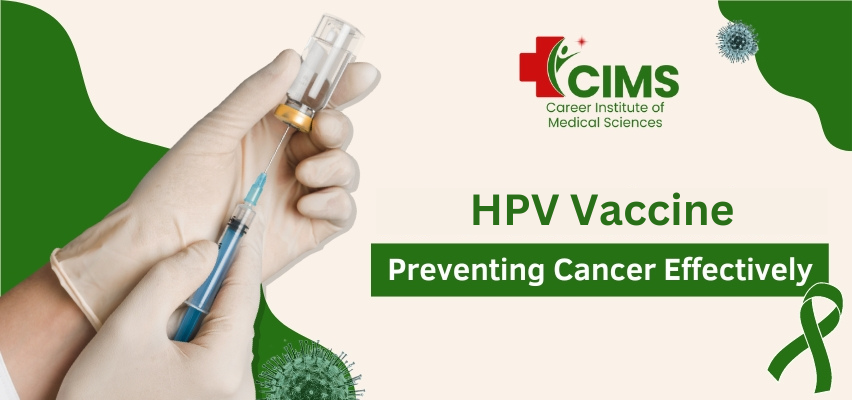Table of Contents
ToggleSurprising Truths About Palliative Chemotherapy

Palliative chemotherapy is a beneficial treatment option for people with advanced cancer. Unlike curative chemotherapy, which aims to stop cancer, palliative therapy focuses on improving the patient’s quality of life by reducing symptoms and slowing the cancer process. This blog details palliative chemotherapy, its objectives, and its benefits, We will also talk about the Best Hospital in Bhopal Career Institute of Medical Science (CIMS) Bhopal.
Quick Facts About Palliative Chemotherapy
Aspect | Details |
|---|---|
Primary Goal | Improve quality of life by reducing symptoms and slowing the process of cancer |
Candidates | Patients with advanced or uncontrollable cancerous |
Benefits | Symptom relief, improved quality of life, extended survival |
Common Side Effects | Hair loss, vomiting, sickness, fatigue, and increased infection risk |
Difference from Curative Chemo | Focuses on curing cancer vs. symptom management |
Treatment Duration | Flexible, less intense than curative chemotherapy |
Key Discussion Points | Benefits, Treatment goals vs. personal choice, risks |
Management Strategies | Lifestyle adjustments, support systems, medications |
Palliative Chemotherapy meaning
Palliative chemotherapy is a type of anti-cancer drug to manage symptoms and reduce the growth of cancer cells in patients for whom treatment is not possible. The main objective is to improve the quality of life by increasing comfort and reducing pain.
How Does Palliative Chemotherapy Work?
Palliative therapy aims to divide cancer cells in the body, reduce their growth, and compress the size of tumors. This process reduces symptoms like difficulty in breathing, pain, and other discomfort problems.
Advantages of Palliative Chemotherapy
- Symptom Relief: Chemotherapy reduces symptoms like pain and stress due to cancer.
- Improved Quality of Life: By the management of symptoms, patients can live a better quality of life.
- Extended Survival: Palliative cancer can extend the life of patients. So patients can spend more time with their loved ones.
Palliative Chemotherapy Side Effects
While improving patients’ quality of life, palliative chemotherapy has side effects. Some of the common side effects are:
- Fatigue: A common side effect that will affect daily activities.
- Sickness and Vomiting: An anti-sickness drug is used to control this condition.
- Hair Loss: A short-term effect that changes with the chemotherapy medication.
- Infection Risk: The immune system gets weak due to chemotherapy.
Differences between Chemotherapy and Palliative Chemotherapy
- Goal: Curative chemotherapy focuses on cancer treatment, whereas palliative chemotherapy focuses on cancer symptom control and improving quality of life.
- Duration: Curative chemotherapy usually applies a more forceful and lengthy, while palliative chemotherapy is more relaxed.
- Intensity: Palliative chemotherapy is generally less harmful in reducing side effects and maintaining the patient’s comfort and day-to-day functioning.
Who is a Candidate for Palliative Chemotherapy?
Patients with advanced cancer who cannot be treated may be suitable for palliative chemotherapy. Decisions depend on the stage of cancer, overall health, and patient preferences.
Discussing Palliative Chemotherapy with Your Doctor
When thinking about palliative chemotherapy, you should openly consult the healthcare specialist. Essential topics for discussion include:
- Purpose of Treatment: Understanding the realistic results and how chemotherapy might help to control your cancer symptoms.
- Possible Benefits and Risks: Considering the possible improvement in quality of life against side effects and impact on day-to-day activities.
- Personal Preferences: Providing the best treatment fits with your values and dreams for your future.
What is palliative care in cancer?
Palliative care can become much more effective and beneficial by managing the side effects well. The following strategies include:
- Medicines: Antiemetic drugs, painkillers, and other treatments for treating side effects in the body.
- Lifestyle changes: Get enough rest, a healthy balanced diet, and a little physical activity to maintain energy and strength in the body.
- Supportive environment: Family, friends, and support groups provide emotional and psychological support to the patient, essential to providing support and comfort.
The Role of Palliative Care Teams
The palliative care team plays an important role in assisting patients undergoing palliative chemotherapy. A team of specialists, which includes doctors, nurses, social workers, and other experts to provide complete treatment to meet physical, emotional, and spiritual needs.
About Career Institute of Medical Science (CIMS)
Best Hospital in Bhopal – CIMS provides the best cancer treatment for people in and around the city. Career Cancer Research Institute is a division of the Career Institute of Medical Science (CIMS) Bhopal. It’s a well-known hospital in Bhopal and Madhya Pradesh. The aim is to provide an accurate diagnosis, affordable cancer treatment, reduce pain, and provide all kinds of medical or surgical emergencies. Improves the patient’s life and helps him or her to live a productive life.
Conclusion
Palliative chemotherapy offers a valuable option for patients with advanced cancer, aiming to enhance quality of life by managing symptoms and slowing disease progression. By understanding its benefits, potential side effects, and the importance of personalized care, patients and their families can make informed decisions that align with their goals and values. Always consult with healthcare professionals to determine the best course of action tailored to your individual needs.
Frequently Asked Questions [FAQs]
Q1: What is palliative chemotherapy?
Answer: Palliative chemotherapy is a type of anti-cancer drug used to manage symptoms and reduce the growth of cancer cells in patients for whom treatment is not possible. The main objective is to improve the quality of life by increasing comfort and reducing pain.
Q2: Can palliative chemotherapy cure cancer?
Answer: No, palliative chemotherapy is not intended to cure cancer but to manage symptoms and enhance the patient’s quality of life.
Q3: What happens after palliative chemotherapy?
Answer: The recovery time during palliative chemotherapy is based on the medicines used and the patient’s general health. Common side effects are vomiting, hair loss, and a low blood cell count.
Q4: Why chemotherapy is painful?
Answer: Chemotherapy is painful because it involves powerful drugs that target rapidly dividing cancer cells, but these drugs can also damage healthy cells in the process.
Q5: Palliative Chemotherapy cost?
Answer: Chemotherapy in India typically costs between 5,000 to 1,00,000. Depends on the medicines and hospital.




It’s very informative blog.